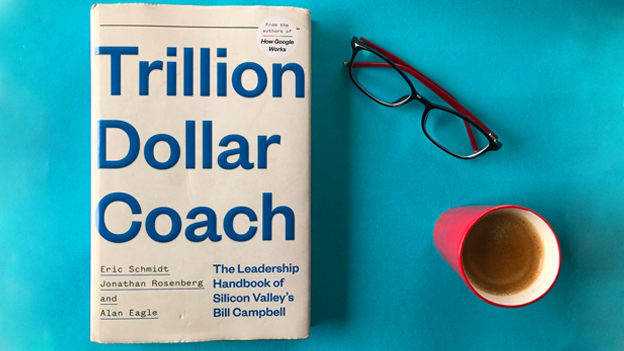Book Review: The Trillion Dollar Coach

Did you know Apple’s Steve Jobs, Amazon’s Jeff Bezos, Google’s Larry Page and Eric Schmidt, Facebook’s Mark Zuckerberg and Sheryl Sandberg and Andressen Horowitz’s Ben shared a leadership coach?
Unless you are a Silicon Valley nerd chances are you may not have heard of Bill Campbell. The book starts at an unlikely place, the memorial meeting in honor of Campbell, who according to the authors of a new book was instrumental in the success of a galaxy of business leaders.
But who was this secret coach?
Bill started his career as the assistant football coach at Boston College, he then moved to the world of business at thirty nine. From the ad agency J. Walter Thompson to Kodak and Apple, Bill rose through the leadership ranks quickly. One of his most influential roles was as the CEO of Inuit. As he continued to stay on at the company as the Chairman, he started mentoring young entrepreneurs at a venture capital firm.
Reading through the book, Bill comes through as possibly one of the kindest person you’d ever meet. The authors note that among the many things that perhaps Bill was known for, “his most notable characteristic, his signature, was the hug.” A big bear hug that showed people that he meant it.
The coach mentality
Bill was a deeply obsessive people champion. Pat Gallagher, a former longtime executive at San Francisco Giants recalls Bill as her best friend – as someone she could talk to about anything. She goes on to add that she knew possibly 2,000 other people who would consider Bill their best friend too.
As a coach, and as a friend, Bill did not give people solutions to their problems, he only showed them they could do things, and helped clarify their thought process by asking questions. At Google, Bill frequented the company’s campus to attend weekly staff meetings. “If Bill had opinions about product and strategy, he usually kept them to himself,” Eric recalls. “But he made sure the team was communicating, that tensions and disagreements were brought to the surface and discussed.”
Part of Bill’s approach to dealing with problems is to put the team’s success ahead of the individual’s. He made sure that everyone’s voice was heard, each point was considered, but that the final decision was taken as a team. Apart from giving undivided attention to people by listening to what they had to say, he said what he felt. “Bill was always 100 percent honest and candid,” the authors write.
As a leader, he also understood that an individual’s personal life could have ramifications on the work life. He took the time to get to know the family members, and he also reached out to help whenever he could.
While writing that Bill had always supported having women at the table, the authors note that he was frustrated with conversations on the topic, which can be a problem.
Bill wasn’t just coaching business leaders. He also took the time to coach the local boys and girls school football team. And actively engaged in community building work.
“The Trillion Dollar Coach” is not a conventional leadership handbook. With chapters on “...envelope of trust”, “the power of love” to advice like “compassion is good for business”, the book is a testament to an individual who was unconditionally selflessness. The authors are great at distilling actionable, perspective advice that can actually be put to use.
The book can lead talent leaders to many questions to reflect on. Are companies investing in building meaningful relationships at work? Are individuals in a team listening enough? Are leaders uplifting the team and building a sense of community? If Bill’s life is one to go by, the answer to all these questions must be ‘yes’.
















